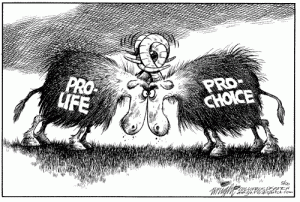Last May, a 17 year-old girl in Utah paid a man $150 dollars to beat her up—kicking her in the stomach—in the hopes of inducing a miscarriage. The baby survived, and the assailant was sent to jail, reports the New York Times.
Now, a bill criminalizing illegal abortion is waiting for Utah’s governor’s signature. On the surface, this seems redundant: An illegal abortion is a criminal act. Utah’s laws define all abortions as illegal unless the health of the mother is at stake, the mother is a victim of rape of incest or the child would be born with serious defects. Any other reason, no matter how sensible it may seem to the mother, is illegal. The implications for such a bill are huge.
Exodus 21:22 deals with violent abortions in a somewhat similar way:
And if men struggle with each other and strike a woman with child so that she has a miscarriage, yet there is no [further] injury, he shall surely be fined as the woman’s husband may demand of him; and he shall pay as the judges decide. But if there is any [further] injury, then you shall appoint as a penalty life for life, eye for eye, tooth for tooth, hand for hand, foot for foot, burn for burn, wound for wound, bruise for bruise.
Compensation in this respect seems fair (especially for Biblical times) – such a violent act deserves retribution, whether monetarily or otherwise. The “eye for eye” business, however, while satisfying the father and mother’s anger, is unnecessary and only serves to perpetuate a cycle of violence that would benefit no one.
Under Utah’s new law, if a woman is found guilty of an illegal abortion, she would be charged with homicide and sentenced to a life in prison. This provision would be enacted, it seems, regardless of method and stage of pregnancy. The girl whose attack sparked this bill was seven months pregnant—far enough along for the fetus to resemble an actual human being. The method in that case was violent and brutal and definitely cause for alarm. But what about a woman in her first few weeks of pregnancy? According to the Mayo Clinic, the fetus in the third week of pregnancy is a cluster of cells known as a blastocyst. Though the cells are alive as, say, your fingernails are alive, there is no consciousness or cell differentiation. The fetus is not yet human, based on the definition that humans are conscious beings. Yes, there is potential for sentient life, but it is difficult to consider the removal of a blastocyst – like the removal of a fingernail – as grounds for a murder conviction.
It also gets dicey when it comes to giving the courts the ability to judge the mother’s reason for getting or wanting to get an abortion. Violent and brutal methods, like being kicked in the stomach, are grounds for some sort of consequence. But what if the mother is a teenager who made a bad decision? Or simply someone who does not have the means to support a child, or even support themselves during pregnancy? Generally, pregnancy is a choice. A woman decides she wants a baby, and goes through the proper channels to get pregnant. If she doesn’t want to get pregnant, there is birth control or abstinence. But if a pregnancy is accidental, and unwanted, then perhaps the same freedom of choice should apply. The reasons for wanting to terminate a pregnancy vary widely. But that is not to say that they are not valid. Putting the courts in charge of something so personal denies women their autonomy, their right to decide whether or not they are willing and able to take charge of another’s life.
Violent abortions should be criminalized because they pose significant harm to the mother. But criminalizing all abortions, save for those that fit narrow, specific criteria, is unfair and could lead to a rise in violent abortions. Better that the service be safe and available than force desperate girls and women to risk their lives.

